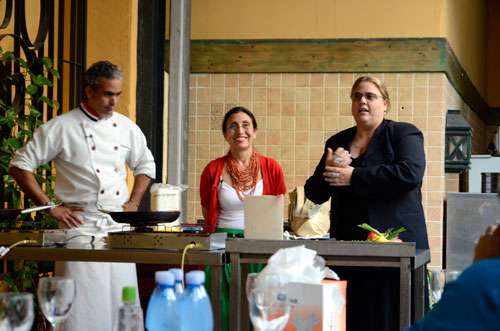I could write this paragraph as if it were a recipe. There is still in my taste the flavor of many delicacies which were the result of a Cuban-Mexican marriage. The Gourmet Festival: Tastes of Cuba and Mexico, a research from the literature, tourism and audiovisual perspective, emerged as a private initiative and it found the necessary support in the state sector.
Cuban Alicia Garcia and Mexican Maria Eugenia del Río, friends and both lovers of audiovisual works and good eating, commented four months ago it would be interesting to make a pairing gourmet between Cuba and Mexico. This idea resulted in a high prestige event, which was held between November 29th and the first of December, and marked a precedent within the gastronomic and intellectual sector.
Alicia Garcia worked for many years at the Cinematheque of Cuba as a curator and researcher, she directs the project Visual Gourmet and she is also the proud daughter of Sergio Garcia, creator of El Ajibe and Rancho Luna, two legendary restaurants that marked a milestone in Cuban restoration with a tradition of more than half a century.
Maria Eugenia del Rio is chef, president of the Foundation Casa Vieja del Río and owner of Casa Vieja restaurant in Campeche, Mexico. Her foundation provided 250 kg of supplies and food for the making of this festival.
They both wanted to unite their passions in order to find a point of contact in the gastronomic and cultural roots of both peoples.
María Eugenia’s father was born in Cuba and took with him many Cuban ways of eating to Mexico. So Mary Eugenia´s family soup tastes her to Cuba.
Cuisine is a heritage. Both Alicia and Maria Eugenia, agree in a common interest to convert eating in an act of cultural identification and communication. They found in the Habaguanex Company a counterpart interested in making transcend cuisine beyond tables and also a vital support for the project.
Other institutions and companies supported this initiative: UNEAC, Ciego Montero, PRODAL, VIMA, the Latin American and Caribbean School of Confectioners, Bakers and Pastry Makers, the Office of the Historian of Havana and the National Institute of Anthropology and History of Mexico.
Chefs of private restaurants also joined the project as Carlos Fuste from Cafe Ajiaco, Luis Hilario Romero of La Chuchería and Raul Hernandez of Bacura. The state sector was represented by chefs Eduardo Santana of El Patio, Néstor Veimar Loyola, of La Imprenta, Ernesto Rodriguez, of La Dominica, Williams Fernandez, of El Templete, among others.
For three days the Gourmet Festival, in Havana´s Historic Center, run with two daily sessions of practice and theory. A royal marriage between cuisine and feeding the intellect. Alicia and Maruja wanted the participants were not only professional chefs but journalists, anthropologists, filmmakers, writers. For them the best way to transcend the heritage of eating is through who can leave a cultural imprint in every age.
La Imprenta restaurant was the venue of workshops and tastings. Veimar N. Loyola was the Cuban host every morning. The first day began with the preparation of typical Campeche dishes. The second day was for Cuban dishes. This time chefs of some restaurants from Habanguanex Company show the best of their art. The culmination of the workshops was a marriage of Campeche and Cuban dishes. Cuban chefs prepared, using Mexican products and methods, unreleased dishes which now will be part of the acerbic gourmet of participants.
In the House of Mexico, another venue of the festival, the evening began with the film Como agua para chocolate, based on the novel of the Mexican writer Laura Esquivel, a conference by Frank Padrón about the gastronomy in movies and a lecture by Professor Maria Esther Abreu with the theme of food in contemporary audiovisual.
The first evening closed with the exhibition of Sabor y Arte. Several contemporary artists interpret a recipe of traditional Cuban cuisine through Victor Manuel Quijano´s curatorship of La Escalera project. Various advertising materials were seen the second day including the little-known short film Conozca a Cuba by Humberto Solas, which was presented this time by Sergio Benvenuto Solas. That evening´s panel also featured interventions by researchers, journalists and semioticians, Yarmila Martinez, Rosa Muñoz and Dr. José Luis Perello. The event reserved f or the final day the exquisite conference La cultura culinaria en los textos de la música cubana by Reynaldo González, Cuban National Literature Prize.
If something the Gourmet Festival proved is the evidence that they are working for the preservation of this heritage which is the culinary culture. Private and state sector chefs shared in an event that wasn´t created by any institution but found institutional space for its taking place. Scenarios are changing in our society and the cuisine is one of the main protagonists of this historical moment. There are people who care about researching and keeping our traditions as means of opposing those who see in the new a way of living.
Gourmet Festival, an initiative of Gourmet Visual, could be written as a recipe of an effective marriage between two economic sectors in search for a common good. In Gourmet Festival the luckiest was our culinary heritage. I wish this experience to happen again and new dishes to come from it.








